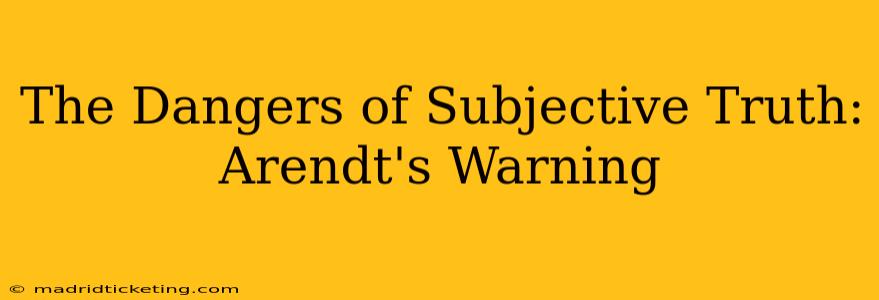Hannah Arendt, a towering figure in 20th-century political philosophy, offered profound insights into the nature of truth and its vulnerability in the face of subjective interpretations. Her work serves as a crucial warning against the dangers of prioritizing personal beliefs over verifiable facts, a phenomenon increasingly prevalent in our contemporary world. This essay will explore Arendt's perspective on subjective truth, examining its potential consequences and highlighting the importance of objective reality in maintaining a healthy and functioning society.
What is Subjective Truth, and Why is it Dangerous?
Subjective truth refers to the belief that truth is relative and dependent on individual perspectives, experiences, or feelings. While acknowledging the role of individual interpretation in understanding the world, Arendt cautioned against the unchecked dominance of subjective truth, particularly in the political realm. The danger lies in its potential to undermine the foundations of shared reality and rational discourse. When individuals operate solely within their subjective frameworks, the possibility of meaningful agreement and cooperation diminishes significantly. Disputes become irresolvable, replaced by a cacophony of competing narratives with no common ground for resolution. This creates fertile ground for manipulation and the spread of misinformation, as demonstrable facts are easily dismissed as merely someone else's opinion.
How Does Subjective Truth Manifest Itself?
Arendt's concern wasn't solely about individual biases; she saw a larger societal threat in the erosion of shared objective reality. This manifests in several ways:
-
Post-Truth Politics: The deliberate dissemination of misinformation and disinformation, often amplified by social media, actively undermines trust in established institutions and factual information. Political discourse becomes increasingly detached from reality, fueled by emotional appeals and unsubstantiated claims.
-
Echo Chambers and Filter Bubbles: Algorithmic curation of online content reinforces pre-existing beliefs, shielding individuals from dissenting viewpoints. This creates echo chambers where subjective truths are amplified, solidifying biases and hindering the ability to engage in critical thinking.
-
Relativism and Moral Nihilism: The belief that all truths are equally valid leads to a sense of moral relativism, where any action can be justified based on individual perspective. This weakens the moral fabric of society and hampers collective action to address shared challenges.
Arendt's Emphasis on the Public Realm and Shared Reality
Arendt emphasized the critical role of the public realm in fostering a shared understanding of reality. The public sphere, characterized by open debate and the exchange of ideas, provides a space where differing perspectives can be challenged and refined. It's within this sphere that a collective understanding of truth can emerge, not through the imposition of a single narrative, but through rigorous examination and reasoned argument. The erosion of the public realm, through polarization and the dominance of subjective truths, weakens the ability of societies to grapple with complex issues and make informed decisions.
What are the consequences of believing only in subjective truth?
The consequences of prioritizing subjective truth are far-reaching and potentially devastating:
-
Erosion of Trust: A society where facts are routinely disregarded and manipulated loses its ability to function effectively. Trust in institutions, experts, and even interpersonal relationships crumbles, leading to social fragmentation and instability.
-
Impossibility of Collective Action: Solving shared problems requires a shared understanding of the problem itself. When individuals operate within radically different realities, collective action becomes impossible. This has profound implications for addressing pressing global challenges like climate change, pandemics, and economic inequality.
-
Rise of Authoritarianism: The absence of shared reality creates a vacuum that authoritarian regimes readily exploit. By controlling information and manipulating narratives, authoritarian leaders can consolidate power and suppress dissent without facing meaningful challenge.
How can we combat the dangers of subjective truth?
Combating the dangers of subjective truth requires a multi-pronged approach:
-
Promoting Media Literacy: Educating individuals to critically evaluate information sources and identify misinformation is crucial. This involves developing skills in evaluating evidence, recognizing biases, and understanding the mechanics of propaganda and disinformation.
-
Strengthening the Public Sphere: Creating spaces for open and respectful dialogue is vital. This involves supporting independent journalism, fostering diverse media outlets, and promoting civic engagement.
-
Re-emphasizing the Importance of Facts and Evidence: Reinforcing the value of objective reality and scientific evidence in decision-making is essential. This involves promoting scientific literacy, supporting research, and holding policymakers accountable for their use of evidence.
In conclusion, Arendt's warning against the dangers of subjective truth remains profoundly relevant in the 21st century. The unchecked dominance of individual perspectives, coupled with the amplification of misinformation, poses a serious threat to the functioning of democratic societies. By strengthening the public realm, promoting media literacy, and re-emphasizing the importance of verifiable facts, we can work to mitigate these dangers and safeguard the foundations of shared reality.

